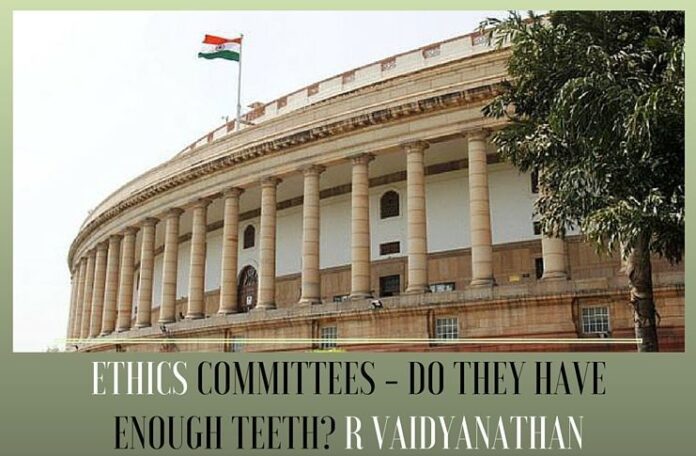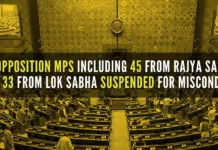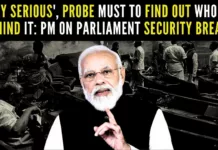
Spotlight on Ethics committee as both houses need to act on conduct of one of their members
[dropcap color=”#008040″ boxed=”yes” boxed_radius=”8px” class=”” id=””]I[/dropcap] am sure many of you may be smiling on seeing Ethics and our Parliament in the same sentence. But believe me, both houses of parliament have ethics committee and the Rajya Sabha one is oldest. It was the first among the two Houses to form an ethics committee, with a full standing committee status, on 30th May, 1997. Lok Sabha, in contrast, formed an ad hoc ethics panel in 2000 and has been operating as one until August 2015 when it was given a permanent standing committee status. The ethics committee in the Lok Sabha has 15 members chaired by L K Advani, while the Rajya Sabha has 10 members chaired by Dr. Karan Singh.
Basically ethics committees formulate code of conduct for its members / monitor the same and also consider the cases referred to it.
Interestingly Rajya Sabha’s Ethics Committee acts both on complaints as well as takes up issues suo moto (on its own motion), Lok Sabha’s committee acts only on complaints made either by any member of the public or any other member of the House. Rajya Sabha has explicitly provided for a ‘Register of Members’ Interest’, where Members of Parliament (MPs) have to declare their interest in five categories: remunerative directorship, remunerated activity, majority shareholding, paid consultancy and professional engagement. In addition to that, members are required to declare any financial interest on an issue that is being debated in the House or under consideration by any other standing committee and hence refrain from taking part to avoid conflict of interest.
[dropcap color=”#008040″ boxed=”yes” boxed_radius=”8px” class=”” id=””]D[/dropcap]id Vijay Mallya provide all these information to the Ethics committee? This is all the more important since he seems to have left India with seven pieces of luggage in Jet Airways in 1st class on a diplomatic passport provided by Rajya Sabha as a law maker. It is possible that his luggage may not be checked due to Diplomatic passport.
Incidentally Rajya Sabha registry is not open to public nor kept in its web page. It can be accessed perhaps by RTI.
Lok Sabha does not maintain such a registry of members interests and apart from disclosing their assets and liabilities, MPs are not obliged to declare other financial interests that might be in direct or indirect conflict with their role as public servants.
In other words Lok Sabha is not concerned about its member’s pecuniary benefits from shareholding etc.
[dropcap color=”#008040″ boxed=”yes” boxed_radius=”8px” class=”” id=””]T[/dropcap]he United Kingdom is perhaps one of the best examples of a good ethics and standards process. The ‘Committee on Standards’ as it is known in the UK, maintains a comprehensive register of member’s financial and material interests that might influence an MPs public function. This has 10 categories including employment, earnings, shareholdings, land and property and even family members engaged in lobbying.
It has a Parliamentary Commissioner of Standards, whose job it is to act on complaints. The Standards committee oversees the work of the commissioner and takes up issues or complaints raised by her. All current and past enquiries are openly listed on their website.
The House of Representatives in the United States also mandates its members to disclose in all of the above mentioned categories as well as embargo on gifts and sponsorships. They are required to separate official and campaign funds, extra-parliamentary income. Family member’s interests need to be disclosed as well. The House follows a process of self-regulation system through two offices: the Office of Congressional Ethics (OCE) and the House Committee on Ethics.
The US Senate goes a step further and prohibits senators from participating in commercial activities as well as sitting on non-fiduciary advisory bodies. The Code is administered and enforced by the Select Committee on Ethics, which is non-partisan and has three members from each party.
To be continued…
- नकली खबर लक्षण है, बीमारी नहीं! - April 16, 2018
- Fake News/ Accreditation and Sedition - April 4, 2018
- Two Poisonous Seeds - March 15, 2018










